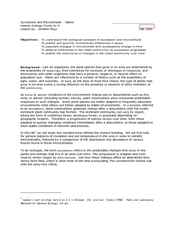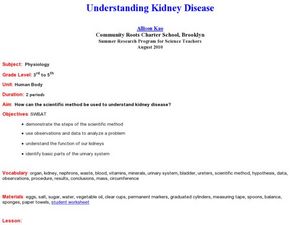Curated OER
Habitat Assessment
Third graders demonstrate the effects of varying environmental components on plants and animals: chemical, physical and biological characteristics of a habitat. They find chemical, physical and biological characteristics of the lake at...
Curated OER
Nature and Fintess Trail
Students investigate how humans impact the environment and compile an organism database into an e-book field guide. They name muscle groups and develop specific exercises to strengthen these groups. Students utilize technology for data...
Curated OER
Amazing Bean Races
Students experiment with bean growth in varied conditions. In this plant biology lesson, students plant beans in soil and in spun cellulose (absorbent material in diapers) and measure the growth of their seedlings. They collect the data...
Curated OER
Marine Protected Areas
Students design a research project about a Marine Protected Area they chose. In this marine biology instructional activity, students gather fish count and catch data then graph them. They create an information poster about their findings.
Curated OER
Using Video to Quantify a Reflex Response to a Stimulus
Learners examine the effects of a stimulus on a reflex by changing the strength or force at which the stimulus is applied. Students chart and record data of the lab using video tape.
Curated OER
Tracy Aviary Wetland Restoration Module - WEST
Students become engaged in wetland conservation as they take part throughout the school year in restoring a small wetland at the Tracy Aviary. They visit the Tracy Aviary wetland at various times during the year and become involved in...
Nuffield Foundation
Investigating Factors Affecting the Breathing Rate of a Locust
Do animals breathe faster when given more oxygen or more carbon dioxide? Young scientists observe the respiration rates of locusts under a variety of gas concentrations to answer that very question. They collect data, analyze the...
Curated OER
Active Ingredient Screening Test for Plants
Students explore the growth of bacteria. They determine if various plant materials contain active ingredients that inhibit the growth of bacteria. In addition, they complete a student data sheet.
Curated OER
Collect Data Using a Transect Line
Middle schoolers learn about transect lines through a study of marine debris. In this marine debris lesson, students calculate the items on a transect line and graph them. Middle schoolers complete a category worksheet.
Curated OER
Scavenger Hunt: Simulating Natural Selection
High schoolers simulate natural selection using pinto beans. In this biology lesson, students identify the factors affecting organism evolution. They record data from the experiment and formulate a conclusion.
Curated OER
Coho Salmon Enhancement
Students build a fish trap across a small stream. The purpose of the trap is to collect baseline data of Oncorhynchus kisutch, Coho salmon, smolt numbers coming out of a spring-fed pond. Other biological data also be measured.
Curated OER
How Do Geology and Physical Stream-bed Characteristics Affect Water Quality?
Students examine geological bedrock in landscape regions and collect data. In this investigative lesson students retrieve data on the Internet then interpret, and graph it.
Curated OER
Microscopes: Is what you see, what you got?
Eighth graders identify the parts and functions of the microscope. For this biology lesson, 8th graders observe different samples under different types of microscopes. They compare and contrast the details they see.
Curated OER
How Do They Know That
High schoolers explore methods for reconstructing the past. In this forest succession lesson, students examine forest succession and how to read the land in order to predict patterns of change. High schoolers will visit a historical...
Curated OER
Nutrients In Chesapeake Bay
Students perform pH and turbidity test to determine water quality. In this environmental science lesson, students analyze NASA database on chlorophyll-a in the bay. They explain how a small river area affects Chesapeake Bay.
Curated OER
Succession and Microclimate
Students compare the population of insects in different microclimates. In this biology lesson, students collect data using probes to tabulate temperature and soil data. They predict how certain parameters change as an area goes through...
Curated OER
Allele Frequencies and Sickle Cell Anemia Lab
Students investigate how selective forces like food, predation and diseases affect evolution. In this genetics lesson, students use red and white beans to simulate the effect of malaria on allele frequencies. They analyze data collected...
Curated OER
Investigate Science Using Crayfish
Young scientists discover the importance of scientific investigation by observing live crayfish. They carefully observe the patterns of crayfish in different environments. Then they discuss their conclusions and define what all living...
Curated OER
Design Your Own Biological Experiment
Students work together to research a topic of interest to them. They form hypothesis and complete experiments testing them. They present their findings to the class.
Curated OER
Lab Experiences: The cookbook Translator
Students preview a copy of the lab experience and "cookbook translator" prior to the actual lab experience. They participate in the lab experience and complete the "cookbook translator" for evaluation at the completion of the laboratory...
Curated OER
The Lynx Eats The Hare
Students investigate the predator and prey relationship. This is done using a simple simulation. The simulation is done as an arts and craft activity. Students record data and track it using a graphic organizer and then they discuss the...
Curated OER
Understanding Kidney Disease
Learners experiment to determine information about kidney function. In this kidney function lesson, students use the scientific method to experiment with eggs, water, salt, sugar, and vegetable oil to simulate kidney function. They...
Curated OER
Life in Extreme Environments - Who is on Top in the Food Chain?
Learners discuss the design of experiments to determine how much and how fast rotifers feed and design experiments with a lab partner and in small collaborative groups. They then collect data from experiments and present results of...
Curated OER
Investigating an Enzyme-controlled Reaction: Catalase and Hydrogen Peroxide Concentration
Are you looking for a way to measure cellular respiration? Try it with pureed potatoes. With some standard high school science equipment, biologists can perform an investigation and collect data surrounding byproducts of respiration. You...

























